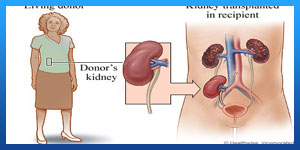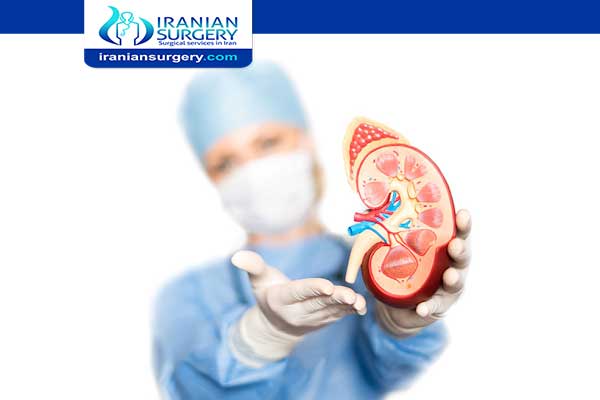Kidney Transplant
How can i find the best kidney transplant in the world?
How much does kidney transplant cost in Iran?
The cost of a Kidney transplant in Iran is around $11,000, compared to its US cost of $400,000, so if you decide to have a Kidney transplant in Iran, reading this article can improve your knowledge about kidney transplant procedure in Iran.

General information about Kidney Transplant in Iran
The following table describes general information about Kidney Transplant in Iran including Kidney Transplant cost in Iran, recovery time, and to name but a few.
General Information |
|
Cost | $ 11000- 13000 |
Anesthesia | General |
Hospital Stay | 7-10 Days |
Back to Work | 8 Weeks |
Duration of Operation | 2-3 Hours |
Minimum Stay in Iran | 10 Days |
Read more about : Iranian eye surgeons restored vision to the eyes of an Omani child.
Read more about : A patient who came from Iraq to Iran for Kidney transplant
Read more about :
Read more about : Kidney cancer treatment
About Iranian Surgery
Iranian surgery is an online medical tourism platform where you can find the best Kidney Transplant Surgeons in Iran. The price of a Kidney Transplant surgery in Iran can vary according to each individual’s case and will be determined based on an in-person assessment with the doctor. So if you are looking for the cost of Kidney Transplant surgery in Iran, you can contact us and get free consultation from Iranian surgery.

Read more about : What are the signs of a transplanted kidney being rejected?
Read more about : Heart transplant in Iran

What is Kidney Transplant?
A kidney transplant is a surgical procedure to place a healthy kidney from a living or deceased donor into a person whose kidneys no longer function properly.
The kidneys are two bean-shaped organs located on each side of the spine just below the rib cage. Each is about the size of a fist. Their main function is to filter and remove waste, minerals and fluid from the blood by producing urine.
When your kidneys lose this filtering ability, harmful levels of fluid and waste accumulate in your body, which can raise your blood pressure and result in kidney failure (end-stage kidney disease). End-stage renal disease occurs when the kidneys have lost about 90% of their ability to function normally.
Common causes of end-stage kidney disease include:
. Diabetes
. Chronic, uncontrolled high blood pressure
. Chronic glomerulonephritis — an inflammation and eventual scarring of the tiny filters within your kidneys (glomeruli).
. Polycystic kidney disease
People with end-stage renal disease need to have waste removed from their bloodstream via a machine (dialysis) or a kidney transplant to stay alive.
Read more about : Do kidney transplants leave scars?
Before Kidney Transplant
Kidney Transplant Conditions for Foreigners in Iran
Those who have the following conditions can transplant their kidneys in Iran:
- There are no facilities and infrastructures needed for kidney transplant in your country.
- Both the recipient and the donor person should have the required documents and the conditions which are necessary for kidney transplant.
- The donor person should be one of your family members or immediate relatives. For example, Azerbaijanis bring a form from their own country for this issue, in which it is stated that the donor person has a second or third-degree family relationship with the recipient. And since there were no first-degree relatives, this person should donate a kidney without a financial request.
- Both the recipient and the donor person must necessarily be from the same country.
- A letter of introduction from the embassy is required for all patients. That is a letter confirming that they are First/ Second /Third-degree relatives.
Why it's done
A kidney transplant is often the treatment of choice for kidney failure, compared with a lifetime on dialysis. A kidney transplant can treat chronic kidney disease or end-stage renal disease to help you feel better and live longer.
Compared with dialysis, kidney transplant is associated with:
. Better quality of life
. Lower risk of death
. Fewer dietary restrictions
. Lower treatment cost
Some people may also benefit from receiving a kidney transplant before needing to go on dialysis, a procedure known as preemptive kidney transplant.
But for certain people with kidney failure, a kidney transplant may be more risky than dialysis. Conditions that may prevent you from being eligible for a kidney transplant include:
. Advanced age
. Severe heart disease
. Active or recently treated cancer
. Dementia or poorly controlled mental illness
. Alcohol or drug abuse
Any other factor that could affect the ability to safely undergo the procedure and take the medications needed after a transplant to prevent organ rejection
Only one donated kidney is needed to replace two failed kidneys, making living-donor kidney transplantation an option.
Read more about : Can you get a second kidney transplant?

Who might need a kidney transplant?
A kidney transplant may be an option if your kidneys have stopped working entirely. This condition is called end-stage renal disease (ESRD) or end-stage kidney disease (ESKD). If you reach this point, your doctor is likely to recommend dialysis.
In addition to putting you on dialysis, your doctor will tell you if they think you’re a good candidate for a kidney transplant.
You’ll need to be healthy enough to have major surgery and tolerate a strict, lifelong medication regimen after surgery to be a good candidate for a transplant. You must also be willing and able to follow all instructions from your doctor and take your medications regularly.
If you have a serious underlying medical condition, a kidney transplant might be dangerous or unlikely to be successful. These serious conditions include:
. Cancer, or a recent history of cancer
. Serious infection, such as tuberculosis, bone infections, or hepatitis
. Severe cardiovascular disease
. Liver disease
Your doctor may also recommend that you don’t have a transplant if you:
. Smoke
. Drink alcohol in excess
. Use illicit drugs
If your doctor thinks you’re a good candidate for a transplant and you’re interested in the procedure, you’ll need to be evaluated at a transplant center.
This evaluation usually involves several visits to assess your physical, psychological, and familial condition. The center’s doctors will run tests on your blood and urine. They’ll also give you a complete physical exam to ensure you’re healthy enough for surgery.
A psychologist and a social worker will also meet with you to make sure you’re able to understand and follow a complicated treatment regimen. The social worker will make sure you can afford the procedure and that you have adequate support after you’re released from the hospital.
Read more about : Pancreatic cancer
Read more about : Prostate Cancer Treatments Pros and Cons
How you prepare
How do I prepare for a kidney transplant?
Evaluation
After you've selected a transplant center, you'll be evaluated to determine whether you meet the center's eligibility requirements for a kidney transplant.
The team at the transplant center will assess whether you:
. Are healthy enough to have surgery and tolerate lifelong post-transplant medications.
. Have any medical conditions that would interfere with transplant success.
. Are willing and able to take medications as directed and follow the suggestions of the transplant team.
The evaluation process may take several days and includes:
. A thorough physical exam
. Imaging studies, such as X-ray, MRI or CT scans
. Blood tests
. Psychological evaluation
. Any other necessary testing as determined by your doctor
After your evaluation, your transplant team will discuss the results with you and tell you whether you've been accepted as a kidney transplant candidate. Each transplant center has its own eligibility criteria. If you aren't accepted at one transplant center, you may apply to others.
What you can expect before the procedure
Finding a match
A kidney donor can be living or deceased, related or unrelated to you. Your transplant team will consider several factors when evaluating whether a donor kidney will be a good match for you.
Tests to determine whether a donated kidney may be suitable for you include:
. Blood typing. It's preferable to get a kidney from a donor whose blood type matches or is compatible with your own. Blood-type incompatible transplants are also possible but require additional medical treatment before and after transplant to reduce the risk of organ rejection. These are known as ABO incompatible kidney transplants.
. Tissue typing. If your blood type is compatible, the next step is a tissue typing test called human leukocyte antigen (HLA) typing. This test compares genetic markers that increase the likelihood the transplanted kidney will last a long time. A good match means it's less likely that your body will reject the organ.
. Crossmatch. The third and final matching test involves mixing a small sample of your blood with the donor's blood in the lab. The test determines whether antibodies in your blood will react against specific antigens in the donor's blood. A negative crossmatch means they are compatible and your body isn't as likely to reject the donor kidney. Positive crossmatch kidney transplants also are possible but require additional medical treatment before and after the transplant to reduce the risk of your antibodies reacting to the donor organ.
Additional factors your transplant team may consider in finding the most appropriate donor kidney for you include matching age, kidney size and infection exposure.
Read more about : Cancer Treatment
Read more about : Orchiectomy surgery for prostate cancer
Living kidney donation
Finding a willing living kidney donor is an alternative to waiting for a compatible deceased-donor kidney to become available.
Family members are often the most likely to be compatible living kidney donors. But successful living-donor transplants are also common with kidneys donated from unrelated people, such as friends, co-workers or religious congregation members.
Paired donation is another type of living kidney donation if you have a willing kidney donor whose organ is not compatible with you or does not match well for other reasons. Rather than donating a kidney directly to you, your donor may give a kidney to someone who may be a better match. Then you receive a compatible kidney from that recipient's donor.
In some cases, more than two pairs of donors and recipients may be linked with a nondirected living kidney donor to form a donation chain with several recipients benefitting from the nondirected donor's gift.
If a compatible living donor isn't available, your name will be placed on a waiting list for a deceased-donor kidney. Because there are fewer available kidneys than there are people waiting for a transplant, the waiting list continues to grow.
Staying healthy
Whether you're waiting for a donated kidney or your transplant surgery is already scheduled, work to stay healthy. Being healthy and as active as you're able can make it more likely you'll be ready for the transplant surgery when the time comes. It may also help speed your recovery from surgery. Work to:
. Take your medications as prescribed.
. Follow your diet and exercise guidelines.
. Don't smoke. If you need help quitting, talk to your doctor.
. Keep all appointments with your health care team.
. Stay involved in healthy activities, including relaxing and spending time with family and friends.
Stay in touch with your transplant team and let them know of any significant changes in your health. If you're waiting for a donated kidney, make sure the transplant team knows how to reach you at all times.
Risks and Side effects
Kidney transplantation can treat advanced kidney disease and kidney failure, but it is not a cure. Some forms of kidney disease may return after transplant.
The health risks associated with kidney transplant include those associated directly with the surgery itself, rejection of the donor organ and side effects of taking medications (anti-rejection or immunosuppressants) needed to prevent your body from rejecting the donated kidney.
Deciding whether kidney transplant is right for you is a personal decision that deserves careful thought and consideration of the serious risks and benefits. Talk through your decision with your friends, family and other trusted advisors.
Read more about : General surgery in Iran
Read more about : Gender Reassignment Surgery (Male To Female)
Complications of the procedure
Kidney transplant surgery carries a risk of significant complications, including:
. Blood clots and bleeding
. Leaking from or blockage of the tube (ureter) that links the kidney to the bladder
. Infection
. Failure or rejection of the donated kidney
. An infection or cancer that can be transmitted with the donated kidney
. Death, heart attack and stroke
Anti-rejection medication side effects
After a kidney transplant, you'll take medications to help prevent your body from rejecting the donor kidney. These medications can cause a variety of side effects, including:
. Bone thinning (osteoporosis) and bone damage (osteonecrosis)
. Diabetes
. Excessive hair growth or hair loss
. High blood pressure
. High cholesterol
. Other side effects may include:
. Increased risk of cancer, particularly skin cancer and lymphoma
. Infection
. Puffiness (edema)
. Weight gain
. Acne
During Kidney Transplant
During the procedure
Kidney transplants are performed with general anesthesia, so you're not awake during the procedure. The surgical team monitors your heart rate, blood pressure and blood oxygen level throughout the procedure.
During the surgery:
. The surgeon makes an incision in the lower part of one side of your abdomen and places the new kidney into your body. Unless your own kidneys are causing complications such as high blood pressure, kidney stones, pain or infection, they are left in place.
. The blood vessels of the new kidney are attached to blood vessels in the lower part of your abdomen, just above one of your legs.
. The new kidney's ureter — the tube that links the kidney to the bladder — is connected to your bladder.
Read more about : Heart Valve Replacement Surgery
Read more about : Knee Replacement Surgery
After Kidney Transplant
After the procedure
After your kidney transplant, you can expect to:
. Spend several days to a week in the hospital. Doctors and nurses monitor your condition in the hospital's transplant recovery area to watch for signs of complications. Your new kidney will make urine like your own kidneys did when they were healthy. Often this starts immediately. In other cases it may take several days, and you may need temporary dialysis until your new kidneys begin to function properly. Expect soreness or pain around the incision site while you're healing. Most kidney transplant recipients can return to work and other normal activities within eight weeks after transplant. No lifting objects weighing more than 10 pounds or exercise other than walking until the wound has healed (usually about six weeks after surgery).
. Have frequent checkups as you continue recovering. After you leave the hospital, close monitoring is necessary for a few weeks to check how well your new kidney is working and to make sure your body is not rejecting it. You may need blood tests several times a week and have your medications adjusted in the weeks following your transplant. During this time, if you live in another town, you may need to make arrangements to stay near the transplant center.
. Take medications the rest of your life. You'll take a number of medications after your kidney transplant. Drugs called immunosuppressants (anti-rejection medications) help keep your immune system from attacking and rejecting your new kidney. Additional drugs help reduce the risk of other complications, such as infection, after your transplant.
Diet and nutrition
After your kidney transplant, you may need to adjust your diet to keep your new kidney healthy and functioning well. You'll have fewer dietary restrictions than if you were receiving dialysis therapy before your transplant, but you still may need to make some diet changes.
Your transplant team includes a nutrition specialist (dietitian) who can discuss your nutrition and diet needs and answer any questions you have after your transplant.
Some of your medications may increase your appetite and make it easier to gain weight. But reaching and maintaining a healthy weight through diet and exercise is just as important for transplant recipients as it is for everyone else to reduce the risk of heart disease, high blood pressure and diabetes.
You may need to keep track of how many calories you consume or limit foods high in sugar and fat.
Your dietitian will also provide you with several healthy food options and ideas to use in your nutrition plan. Your dietitian's recommendations after kidney transplant may include:
. Eating at least five servings of fruits and vegetables each day
. Avoiding grapefruit and grapefruit juice due to its effect on a group of immunosuppression medications (calcineurin inhibitors).
. Having enough fiber in your daily diet
. Drinking low-fat milk or eating other low-fat dairy products, which is important to maintain optimal calcium and phosphorous levels.
. Eating lean meats, poultry and fish
Your dietitian may also recommend:
. Maintaining a low-salt and low-fat diet
. Following food safety guidelines
. Staying hydrated by drinking adequate water and other fluids each day
Read more about : Bariatric surgery
Read more about : Gastric Band vs Gastric Sleeve
Exercise
Once you recover from your transplant surgery, exercise and physical activity should be a regular part of your life to continue improving your overall physical and mental health.
After a transplant, regular exercise helps boost energy levels and increase strength. It also helps you maintain a healthy weight, reduce stress, and prevent common post-transplant complications such as high blood pressure and cholesterol levels.
Your transplant team will recommend a physical activity program based on your individual needs and goals.
Soon after your transplant, you should walk as much as you can. Gradually, start incorporating more physical activity into your daily life, including participating in at least 30 minutes of moderate exercise five days a week.
Walking, bicycling, swimming, low-impact strength training and other physical activities you enjoy can all be a part of a healthy, active lifestyle after transplant. But be sure to check in with your transplant team before starting or changing your post-transplant exercise routine.
Results
After a successful kidney transplant, your new kidney will filter your blood, and you will no longer need dialysis.
To prevent your body from rejecting your donor kidney, you'll need medications to suppress your immune system. Because these anti-rejection medications make your body more vulnerable to infection, your doctor may also prescribe antibacterial, antiviral and antifungal medications.
It is important to take all your medicines as your doctor prescribes. Your body may reject your new kidney if you skip your medications even for a short period of time. Contact your transplant team immediately if you are having side effects that prevent you from taking your medications.
After your transplant, skin self-checks and checkups with a dermatologist to screen for skin cancer and keeping your other cancer screening up-to-date is strongly advised.
Kidney Transplant Cost
The cost of Kidney Transplant in Iran is between $ 11000-13000.
Read more about : Prostate biopsy anesthesia
Read more about : Anal Fissure Surgery In Iran



24 Comments
What causes rejection after a kidney transplant?
Rejection is due to the same immune response that protects yourself against colds and other viruses. Though we run tests to indicate how likely rejection will be, there is no way to be sure about whether rejection will happen or not
How expensive is a kidney transplant?
need a kidney transplant live in england also a turkish citizen
hello namik, it is against the rules and regulations of islamic republic of Iran to transplant kidney for foreigners involving an iranian donor person, so in order to have kidney transplant in Iran you should bring a donor person from your own country.
selling or buying kidney in Iran is completely illegal.
I see in posts a Dr Eugene curry is looking to buy people’s kidneys and you have stated that it is illegal for some one to do this in Iran as I am from Ireland I would like to know. Thank you
Hi, iam MD, practising foctor from india. My blood gp is o+ve. Need renal transplantation . I can bring donor from india. What will be total cost for both surgeries and time to remain in iran. Also nsme of hospital and surgon thanx
Contact details? How to talk
I want to sell my kidney
hello dear soheb, selling kidney in Iran for foreigners is illegal.
Is it illegal to sell your kidney in Iran as I’m from Ireland and am willing to sell 1 of mine
I want to sell my kidney
selling kidney in Iran for foreigners is illegal.
selling kidney in Iran for foreigners is illegal.
hello dear, selling kidney in Iran is illegal.
Hello, i have a brother whom need s a kidney..
if I donate a kidney would I be able to live with only one?and how can I know if I’m the right candidate for donation?
Hello Michael. i hope your brother health gets better ASAP.
you should go to a hospital or clinic and have a blood test to see if you are a match with him.
after that if you are then you should start reading the side effects of kidney donation, so you would be doing it with having them in mind.
Hello Dr. hope you are good. my brother is a 48 year man with kidney failure and he s been in transplant list for 4 months now.
I was wondering if we can bring him to Iran and you provide us a donor. please inform us if possible
regards
damon
hello Damon.
by law we can’t provide you any donors at Iran for you. but if you find a donor which is a family member and the donor is match with patient we will gladly start procedure for you in iran. for more information you can message our agents via what’s app on this number +989019290946
1.How to obtain a donor for foreigners in Iran?.
2. Can i bring a different nationality as my donor.
Unfortunately, there is no chance for a foreigner to have an Iranian donor. The only possible way is that you bring a donor of the same nationality as yours.
Can I sell my kidney..If I can. I am B Positive 50 years from India. I have passport
Dear Khageswar
It’s illegal to sell organs and tissues for transplants in Iran.